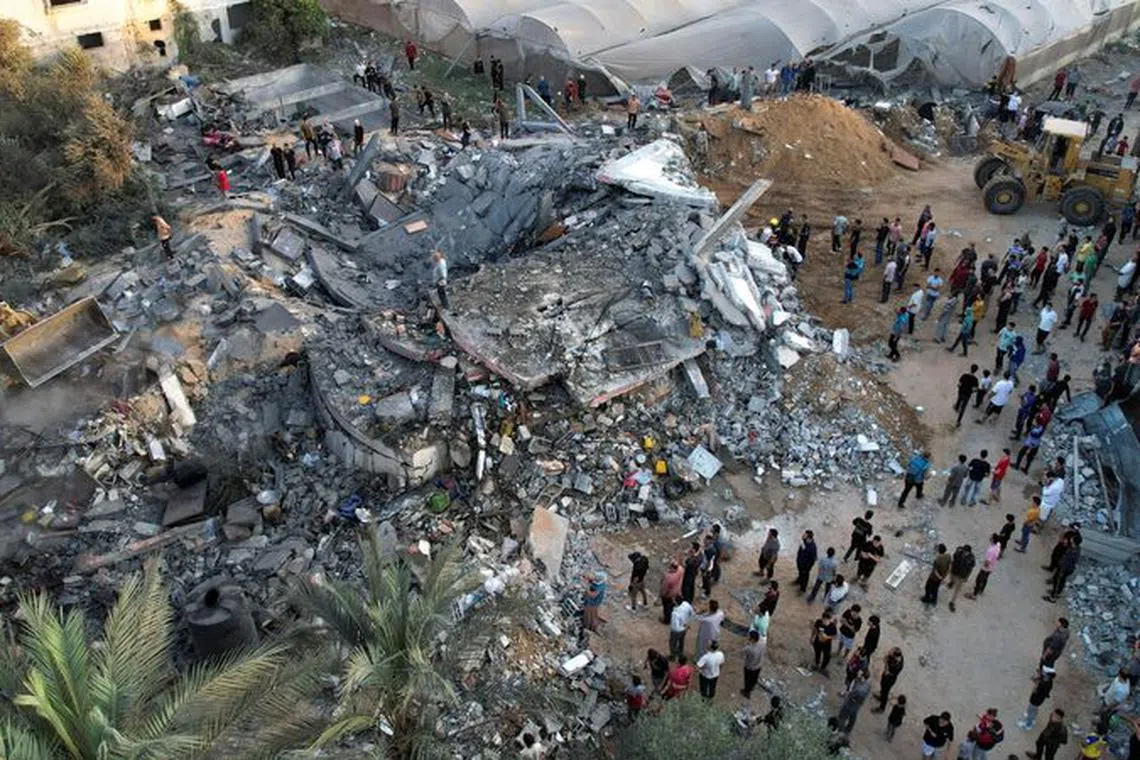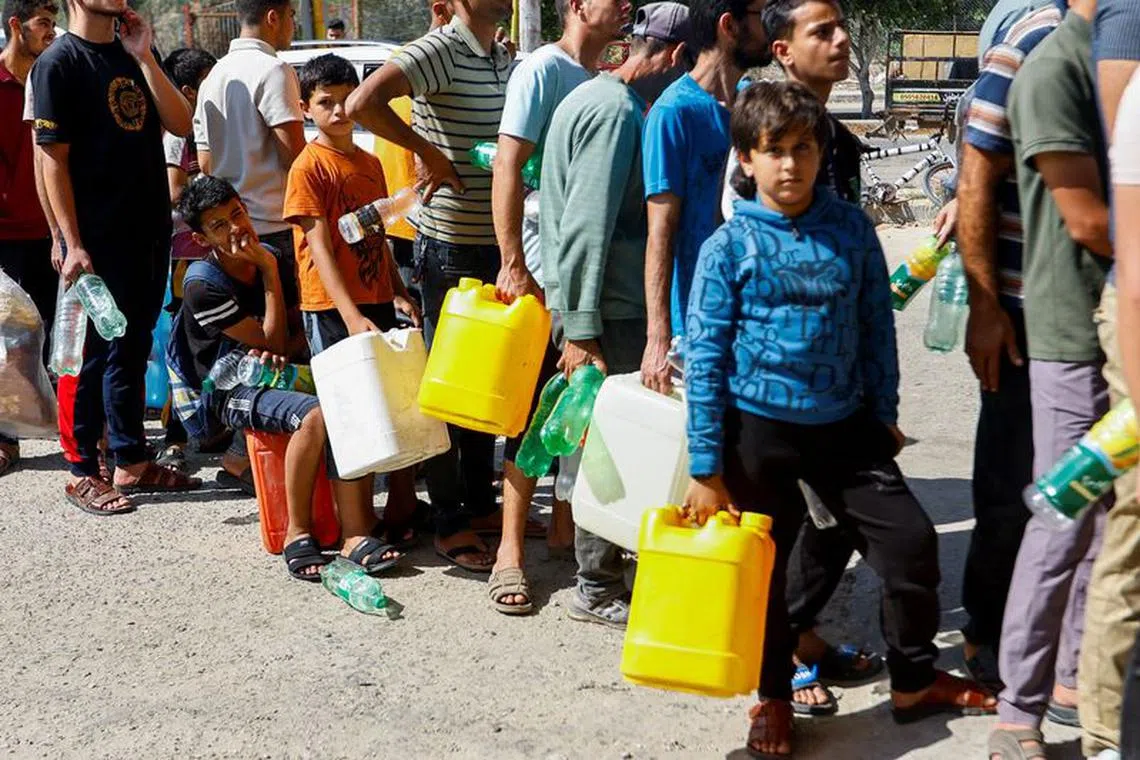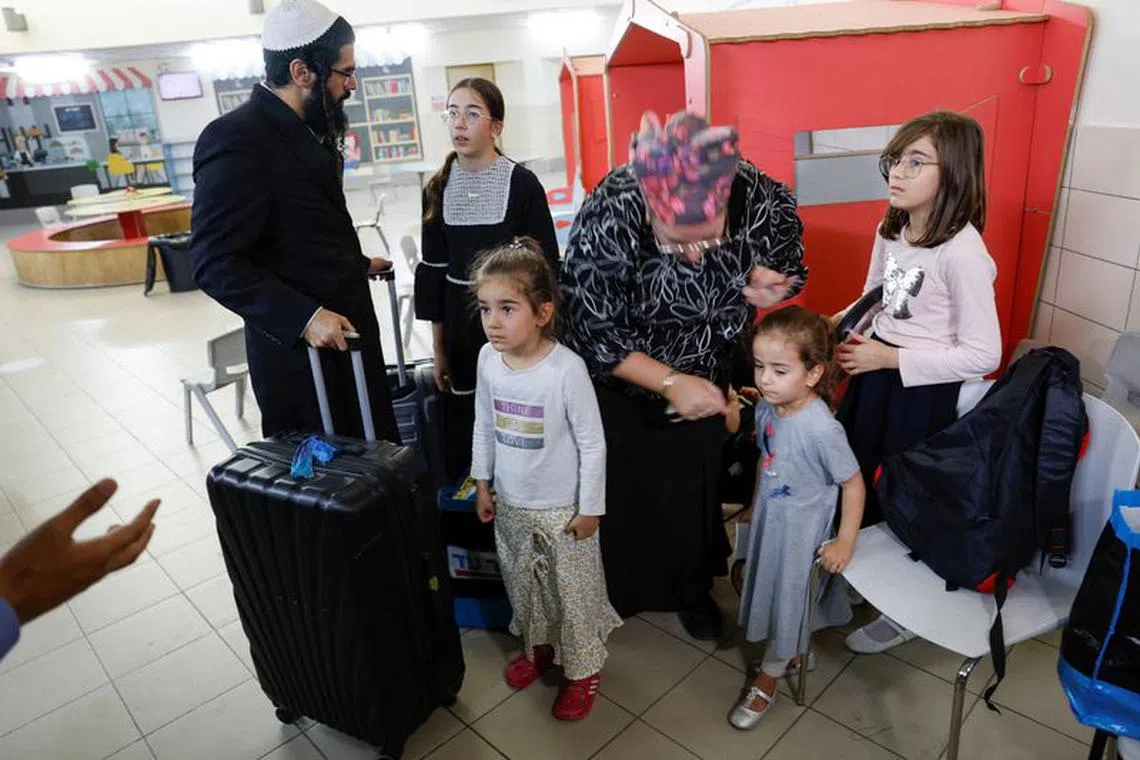Israel vows to demolish Hamas as troops prepare to move on shattered Gaza
Sign up now: Get ST's newsletters delivered to your inbox
Follow topic:
GAZA/JERUSALEM - Israel's Prime Minister Benjamin Netanyahu vowed on Sunday to "demolish Hamas"
Israel has urged exhausted Gazans to evacuate the south, which hundreds of thousands have already done in the besieged enclave that is home to more than 2 million people. Hamas, which runs Gaza, has told people to ignore Israel's message.
Inside Gaza's narrow and crowded streets, conditions were deteriorating as deaths from Israeli air strikes rose. Bodies were stored in ice cream freezer trucks because moving them to hospitals was too risky and cemeteries were full.
With fears of the conflict spilling further, US Secretary of State Antony Blinken continued his tour of Middle East states,
Arab leaders stressed the need to protect Gaza civilians.
"The reaction went beyond the right to self-defence, turning into collective punishment," said Egypt's President Abdel Fattah al-Sisi of Israel's retaliatory strikes.
Clashes on Israel's border with Lebanon, the deadliest since 2006, have underscored the dangers of regional spillover.
On Sunday, Hamas' armed wing Al Qassam Brigades said it fired 20 rockets from Lebanon at two Israeli settlements while Lebanon's Hezbollah militia said it fired missiles at Israeli barracks in Hanita and had inflicted casualties.

A view shows the remains of a Palestinian house destroyed in Israeli strikes in the central Gaza Strip on Oct 15.
PHOTO: REUTERS
Israel said it was striking Lebanon in retaliation, and the UN peacekeeping force said its headquarters in south Lebanon had been hit by a rocket.
Iran, which backs both Hamas and Hezbollah, warned Israel of escalation if it kept attacking Palestinians.
"If the Zionist aggressions do not stop, the hands of all parties in the region are on the trigger," said Foreign Minister Hossein Amirabdollahian, adding that Teheran could not simply stay an observer.
Mr Blinken met Saudi Arabia's Prince Mohammed bin Salman in Riyadh
"There's a determination in every country I went to, to make sure that this conflict doesn't spread," said Mr Blinken, who was due back in Israel on Monday.
"They are using their own influence, their own relationships, to try to make sure that this doesn't happen."
Israeli resolve
Mr Netanyahu convened Israel's expanded emergency Cabinet, including former opposition lawmakers, in a show of unity. "Hamas thought we would be demolished. It is we who will demolish Hamas," he said.
Israel is carrying out the most intense bombardment Gaza has ever seen in response to the killing of 1,300 people when Hamas fighters rampaged through Israeli towns on Oct 7.
They shot men, women, children and soldiers and seized hostages in the worst attack on civilians in Israel's history.
Graphic video of the attacks, and reports from medical and emergency services in the overrun towns and kibbutzes, deepened Israelis' sense of shock.
France said 19 of its citizens had died in the Hamas attacks, with 13 others still unaccounted for and possibly taken hostage. Canada raised its fatality toll to five.
Authorities in Gaza said at least 2,670 people had so far been killed by Israel's retaliatory strikes, a quarter of them children, and nearly 10,000 wounded. Another 1,000 people were missing and believed to be under rubble.
Gaza hospitals are running short of supplies and struggling to cope with the numbers of wounded.
Among them was four-year-old Fulla Al-Laham, 14 members of whose family, including her parents and siblings, died in an Israeli air strike. "May God keep me alive to take care of her," said her grandmother Um Muhammed Al-Laham, who held the girl's hand as she lay in a hospital on a drip with a bandaged arm.

Palestinians queue as they wait to fill cans with fuel, amid shortages of fuel, as the Israeli-Palestinian conflict continues, at a petrol station in Khan Younis in the southern Gaza Strip on Oct 15.
PHOTO: REUTERS
On the move
Israel's military, which has massed tanks on Gaza's border in preparation for a ground offensive, says it is targeting Hamas and its infrastructure. Israeli aircraft on Sunday struck about 250 military targets, killing the Hamas southern district commander, the military said.
Israeli military chief Lieutenant General Herzi Halevi told soldiers near the Gaza border they would be entering Gaza to root out Hamas, targeting "every place, every commander, every operator."
"You are about to do something big and important, that needs to change the situation for a long time in a clear way," Mr Halevi said.
An Israeli blockade has prevented fuel, food and water from entering Gaza, although Netanyahu had agreed with US President Joe Biden to resume the water supply to parts of southern Gaza, a minister said on Sunday.
The Israeli military said some 600,000 Gazans had left the northern half of the territory, which includes Gaza City's more than 1 million residents.

People stand with their belongings as Israelis are evacuated from the southern town of Sderot, near Israel’s border with Gaza, on Oct 15.
PHOTO: REUTERS
Some Palestinians who went south said they were heading back north because they were attacked wherever they went.
Dr Hussam Abu Safiya, an intensive care doctor on a children's ward at the Kamal Edwan hospital in northern Gaza, said the order to evacuate was impossible.
"In this ward as you can see, there are children who are attached to ventilators, and now we have been asked to evacuate the hospital, where should we evacuate these children?"
The World Health Organization said Israel's orders to evacuate 22 Gaza hospitals were a "death sentence for the sick and injured".
UN relief operations in Gaza "are on the verge of collapse," said Mr Philippe Lazzarini, commissioner general of the UN agency for the Palestinians, UNRWA.
"The number of people seeking shelter in our schools and other UNRWA facilities in the south is absolutely overwhelming, and we do not have any more the capacity to deal with them," he said. REUTERS

